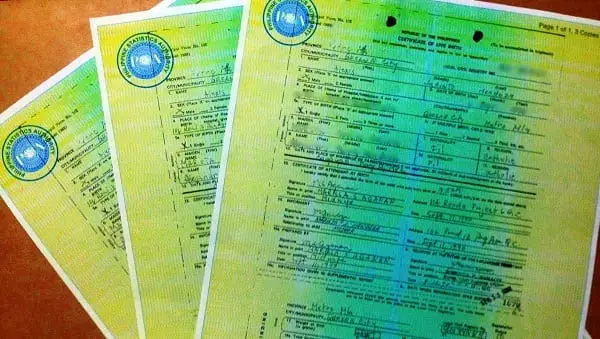
Almost everywhere you go, someone always asks for a PSA birth certificate. Have you got hired? HR will request your birth certificate. Are you applying for the civil service exam? You need one in case none of your valid IDs shows your date of birth. And don’t get me started with government-issued documents like the Philippine passport and driver’s license that all require a birth certificate to prove your identity. It is, therefore, inevitable to find yourself applying for a birth certificate occasionally. Fortunately, getting this primary document has never been easier. You can do the traditional walk-in application at designated offices or eliminate all the hassles by ordering online. This definitive guide presents different ways to get your PSA birth certificate fast, whether in the Philippines or anywhere in the world.
| Mode of Application | Price per copy | Processing Time | More info |
| PSA Serbilis (online) | ₱330 (Philippines); USD 20.30 (other countries) | Estimated delivery: 3-9 working days in the Philippines and 6-8 weeks in other countries | Click here |
| PSA CRS Outlet (requires online appointment) | ₱155 | The birth certificate is released within 1 to 2 hours upon arrival. | Click here |
| SM Business Center (walk-in) | ₱180 | The birth certificate is released within 4 to 6 days after application. | Click here |
According to the Philippine Statistics Authority (PSA), a birth certificate is a “vital record that establishes the birth of a child“ 3 .

Shortly after a baby’s birth, the doctor files the report of birth to the local civil registrar (LCR). The birth certificate is then issued to and stored by the LCR. All records of birth certificates are archived at the Philippine Statistics Authority or PSA (formerly National Statistics Office or NSO).
When you say “birth certificate,” it refers either to the original document or to the certified true copy of the original.
The birth certificate has no expiration date. However, PSA occasionally changes the Security Paper where civil registry documents are printed to prevent the proliferation of fake birth certificates.
As a result, some government agencies or public institutions require applicants only to present recent or new authenticated birth certificates. These include:
A birth certificate is crucial for getting a new job, applying for government-issued IDs, proving your nationality, or verifying whether you’re a legitimate child.
You are authorized by law 4 to apply for and receive a birth certificate from the Philippine Statistics Authority (PSA) if you’re one of the following:
Suppose the owner of the birth certificate is still a minor. In that case, the parents or the guardian are the only ones allowed to receive or authorize the birth certificate’s delivery. The one who will receive the birth certificate is required to present a valid ID. If this receiving party is the minor’s guardian, a valid ID plus proof or declaration of guardianship must be presented.
Whether you’re requesting a PSA Birth Certificate online or by walking in at the nearest SM Business Center, you won’t be able to receive it without presenting a valid ID. According to the most recent memorandum 5 from the Philippine Statistics Authority, here’s a list of valid IDs accepted by their office:
If you’re the document owner claiming your PSA Birth Certificate: Bring your valid ID’s original copy and photocopy (front and back). Present the original ID and submit the photocopy.
If you’re an authorized representative requesting the PSA Birth Certificate on behalf of the document owner: In addition to the original and photocopy of the document owner’s valid ID, you must also bring the original and photocopy (front and back) of your valid ID. Present the original and submit the photocopy.
This requirement only applies if the document owner cannot claim the PSA Birth Certificate personally.
The authorized representative must present and submit the original copy of the Authorization Letter or Special Power of Attorney, the content of which must comply with the following guidelines 6 :
PSASerbilis is an online portal where you can order a birth certificate and deliver it to the Philippines or anywhere in the world. Here’s how to obtain your birth certificate through this website:
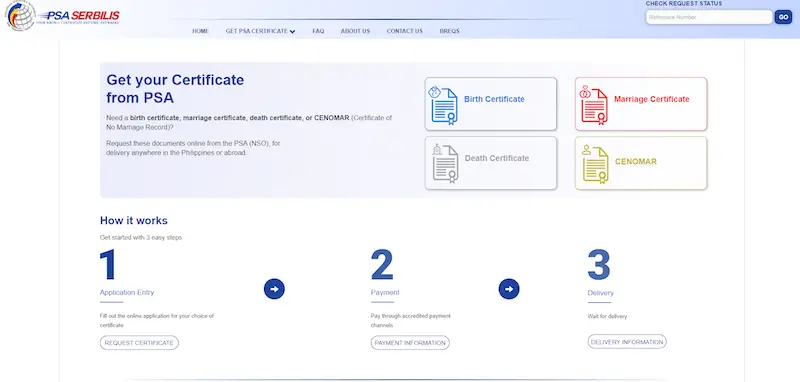
From the homepage, select Birth Certificate.
Tick the checkboxes to agree with the terms and conditions and data privacy notice. Click the Next button.

Next, respond to the questions about whether there’s any correction in the birth certificate you are applying for and if you have already obtained a PSA Birth Certificate. Click Next.
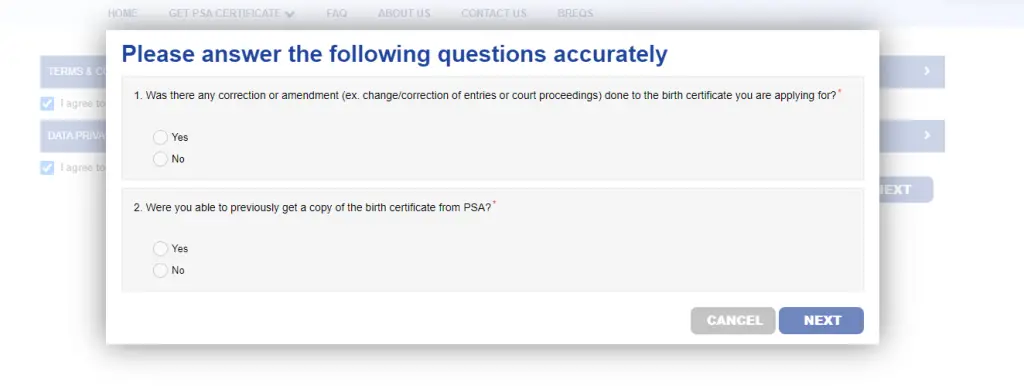
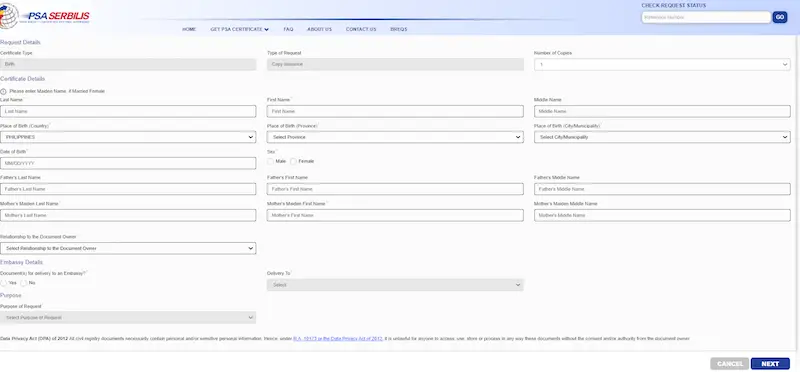
Enter the following details in the form:
Afterward, you will choose whether this certificate will be delivered to an embassy. If yes, you have to select from the dropdown list provided which of the following embassies it will be delivered to:
You also have to select the purpose of your request using the dropdown menu.
When done filling out the form, click Next.
Notes:
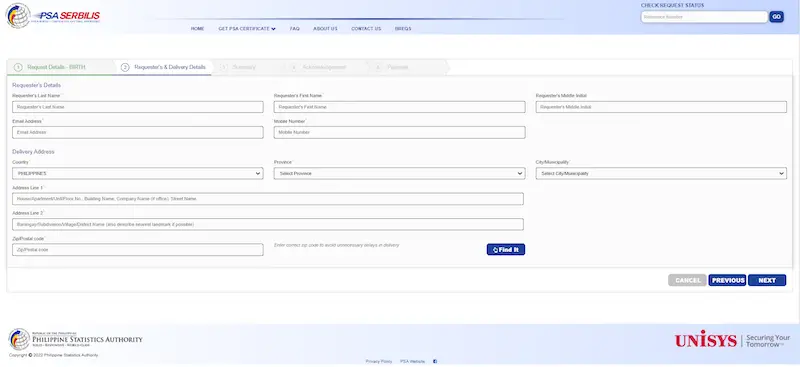
These include the following:
a. Requester’s details
b. Delivery address
When done, click Next.
A box will then appear on the screen asking you to confirm whether the information you’ve just provided is correct. The delivery schedule is from 8 AM to 5 PM on weekdays.
If you’re sure about their accuracy, click Confirm.
Afterward, PSASerbilis will present a summary of your online application.
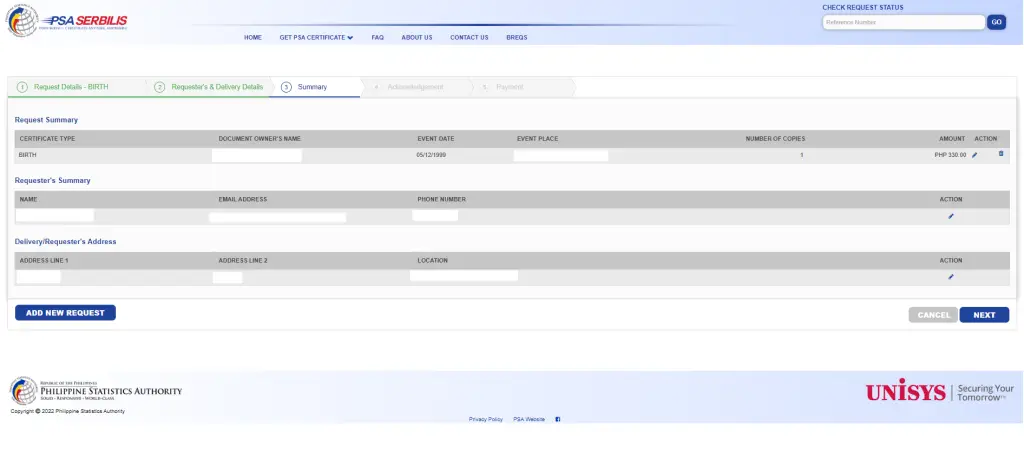
You may also request another PSA-issued document by clicking the Add New Request button. Otherwise, click Next to proceed.
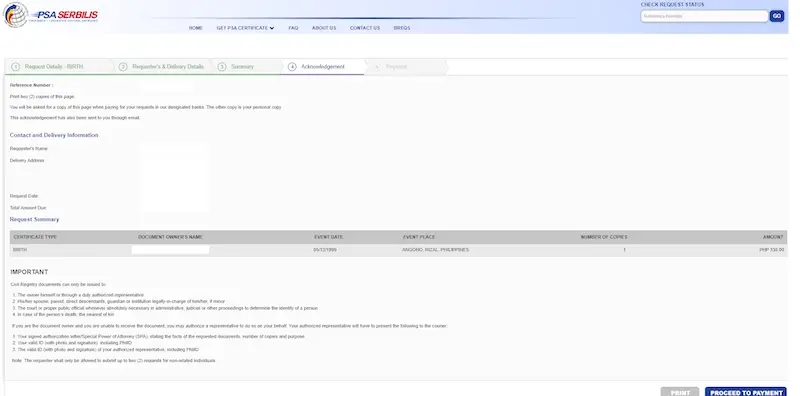
You must present a hard copy of this page when you pay for your request in a PSA-designated bank. Meanwhile, the other one serves as your copy.
You will also receive a soft copy of the acknowledgment page via email.
To print copies of this page, click the Print button. If you’re done, click Proceed to Payment.
A single copy of the Birth Certificate costs:
Here are the available payment channels:
For local delivery:
For foreign countries:
Accredited Banking Payment channels:
How quickly the birth certificate will be delivered to you depends on your delivery address:
If you want to expedite the process and get the birth certificate delivered within 1 to 2 days after payment, I suggest the following:
The delivery schedule is from 8 A.M. to 5 P.M., Monday to Friday (except holidays).
Obtaining your PSA Birth Certificate at the nearest PSA CRS (Civil Registration System) Outlet in your town or city is the cheapest option recommended for those on a budget.
The downside is all applicants must secure an appointment online as the PSA offices process requests on a first-come, first-serve basis. Also, minors cannot book an appointment; their legal guardians must secure their slots online.
Before we proceed with the online appointment, ensure you have all requirements ready (see the previous section for the complete list of essential requirements).
Assuming you already have the basic requirements, follow the steps below to secure an appointment with your preferred PSA CRS Outlet.
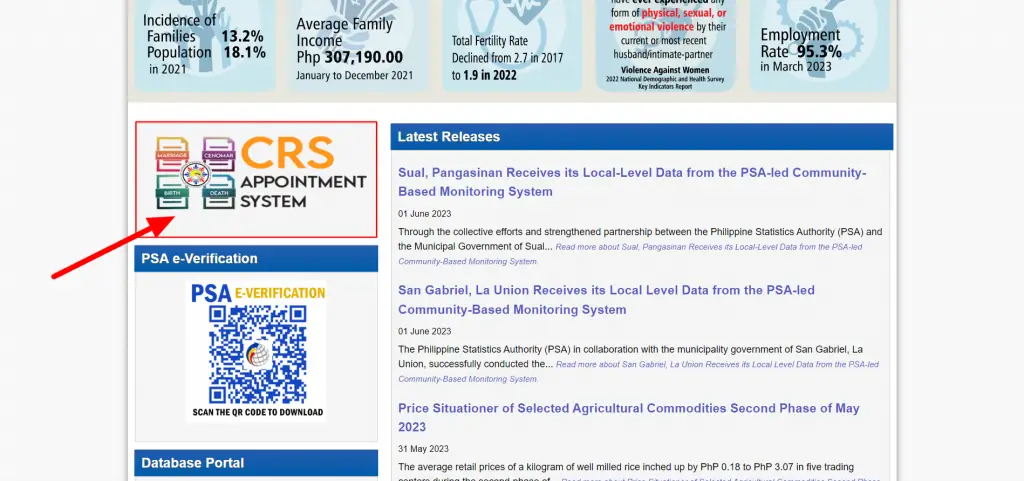

Walk-in applications are welcome at various SM Business Centers nationwide.
A 2010 tie-up between SM and NSO has enabled the SM Business Center, usually located within SM Department Stores, to process and release civil registry documents like birth, death, and marriage certificates, among others.
SM Business Center is also known for its other services like foreign exchange, bills payment, BDO Remit, and SSS and Pag-IBIG contributions processing.
The advantage of choosing SM Business Center to get your birth certificate is its accessibility. Almost every town and city in the country has its own SM mall.
PSA Birth Certificate Walk-in Application Guide (SM Business Center)
Birth certificates processed at SM Business Centers may take days to release.
If you’re not in a hurry, you can get your birth certificate from SM Business Center by following the steps below:
If you’re requesting the birth certificate of someone born before 1945, the PSA will only issue you a Negative Results Certification, which means no birth record can be found in their archives.
The only documents that can be retrieved from the electronic and paper archives of the civil registry records are the births, marriages, and deaths that have been reported from 1945 to the present and from 1951 onwards for events reported in Manila.
After securing the Negative Results Certification from PSA, you are left with three options to obtain the birth certificate of someone born before 1945:
Birth certificates of babies born recently can’t be processed immediately because the new birth records usually go through a “posting period” first.
In this posting period, the birth records are received from the local civil registrar, verified, and then converted into a digital format by the PSA. How long the process will take depends on the records at the PSA and where the birth occurred.
If you want to request your baby’s birth certificate through the standard procedure, do it after the following “posting period”:
Meanwhile, suppose you can’t wait for this posting period and need to obtain your newly born child’s birth certificate as soon as possible. In that case, you may file for “advance endorsement” at the local civil registrar (LCR) of the city/municipality where your child was born.
Although it comes with a fee, the advance endorsement enables the LCR to endorse a copy of the birth certificate to the Philippine Statistics Authority (PSA) ahead of the regular submission schedule of birth records.
Even Filipinos who were born abroad can also get a copy of their birth certificates from the Philippine Statistics Authority (PSA), provided that a Report of Birth was filed by the parent/s at the Philippine Consulate in the child’s country of birth within one year from the date of birth.
After the birth registration at the Philippine Consulate, the child’s birth record is transmitted to the Consular Records Division of the Department of Foreign Affairs (DFA) – Manila.
All the civil registry documents, including birth records, are forwarded to the PSA, usually every quarter. You can only request the PSA birth certificate at least two months after the PSA receives the birth record from DFA.
If you’re requesting a birth certificate owned by you or anyone born abroad, you will need to obtain the following information from DFA Manila’s Consular Records Division:
Send the above information to [email protected] so the PSA can search and retrieve your birth records beforehand.
Check the updated list of requirements for the Philippine passport application. It includes an original Philippine Statistics Authority (PSA) Authenticated Birth Certificate on Security Paper (SECPA).
But according to DFA’s FAQ page, NSO birth certificates are still valid and accepted for Philippine passport applications.
In other words, you don’t need to request a new PSA copy if you already have the older NSO copy, provided that the latter is still in good condition and doesn’t have tampered entries.
On the other hand, those who are applying for Philippine passport renewal don’t need to bring a PSA birth certificate.
The Certificate of Live Birth is the first unofficial document proving you were medically alive when your mother gave birth.
The Certificate of Live Birth Form is for data entry purposes only. After the parent fills out this form, the hospital administrator sends the birth records to the local civil registrar within 30 days after birth.
The local civil registrar will forward this to the Philippine Statistics Authority (PSA) for verification and encoding. After a few months, the baby’s official Birth Certificate can now be requested.
Unlike the Certificate of Live Birth, the official Birth Certificate is printed on security paper (SECPA), has a registration number to be retrieved quickly, and comes with the official PSA seal for authenticity.
Double registration or having two birth certificates under one’s name is prohibited in the Philippines.
However, there are instances when double registration happens unintentionally.
Some Filipinos file a late birth registration, not knowing they’re already registered. Others make the mistake of applying for a second birth certificate to replace the first one containing errors/misspellings/wrong info, unaware there’s a separate procedure for birth certificate correction.
Whatever the case, the first birth certificate will always prevail as the official document, regardless if it contains errors or not 8 . If it does contain errors, file the appropriate birth certificate correction.
As for the second birth certificate, it is considered invalid. It should be subsequently canceled by filing a Petition for Cancellation of Entry before the Regional Trial Court (RTC) with jurisdiction over the civil registrar where the birth certificate was created/registered (Section 1, Rule 108, Revised Rules of Court).
After the petition is filed, the court will order when and where the hearing will occur. The court will also order the notices to be given to people named and involved in the petition. This order will be published once a week for three consecutive weeks in a major newspaper.
How long the cancellation proceeding will last depends on the availability of the judge hearing the petition, the number of cases of the court where the petition will be raffled, and a host of other factors.
When the Philippine Statistics Authority or PSA (formerly NSO) is unable to retrieve your birth certificate from their database, your request will return a “negative intact” result and you’ll be issued a corresponding “Negative Results Certification” or NRC.
There’s no need to panic though because having no record of birth in PSA could mean any of the following:
a. Your birth records/certificate exist but the local civil registrar (LCR) where your birth was registered hasn’t forwarded or transmitted the said files to the PSA yet. To obtain a copy of your birth certificate, you must first request an Endorsement.
b. The hospital attendant or midwife (if you’re born at home) failed to register your birth with the local civil registrar within 30 days from the time of birth. As a result, no record of your birth can be retrieved either from the PSA or the local civil registrar. If this is the case, you must file a Late Registration of Birth.
c. Your birth records exist in the local civil registrar but for some reason (e.g., due to fire, mishandling, etc.), they got lost. Through a process called Reconstruction, the LCR can help recreate your birth certificate and forward it to PSA for encoding.
Among the three mentioned above, the first one is the most common reason why PSA can’t issue your birth certificate.
Since your birth records are still intact but haven’t been forwarded to PSA yet, you can personally visit the local civil registrar where your birth was registered and do a follow-up.
File a request for endorsement of your birth certificate with the civil registrar’s office who will then verify if such record exists.
If upon checking the database they’re able to prove your birth is registered with them, you’ll be asked to pay an endorsement fee. On the other hand, if none of your records are found either at the PSA or the local civil registrar, it means you should file for a Late Registration of Birth.
After paying the endorsement fee, the civil registrar will then prepare and sign the endorsement letter with an attached copy of your birth certificate retrieved from their database. The copy should be marked with “For OCRG File” which means it’s addressed to the PSA – Office of the Civil Registrar General (OCRG).
There are cases when the document is not available at the local civil registrar but the Registry Book has the record of the event. If this is the case, request for a transcription (LCR Form 1A or 3A) where the PSA – Office of the Civil Registrar General (OCRG) is indicated in the portion that says “This certification is issued to____.”
Either way, the document must be sent to the following:
THE CIVIL REGISTRAR GENERAL
Philippine Statistics Authority
3rd Floor CRS Bldg., PSA Complex, East Avenue, Quezon City
ANS Marizza B. Grande
You may get a copy of this endorsed document by securing an online appointment through the CRS Appointment System. Choose the East Avenue branch and make sure to submit the requirements listed below to this specific address: CDLI Application Area, 1st Floor CRS Bldg., PSA Complex, East Avenue, Quezon City
a. Certified True Copy of the document obtained from the local civil registrar
b. Receipt of forwarder/courier (if the endorsed document is sent to PSA via a courier like JRS, LBC, etc.)
c. Endorsement letter from the local civil registrar
d. Negative Certification from the PSA
After submitting the documents, you’ll be given a claim stub indicating when the document will be released. Return to the same branch and building on the date shown in the stub to claim the documents.
PSA Birth Certificates do not expire. They have lifetime validity as stipulated in Republic Act No. 11909 9 .
This means that any government agency, a private institution, or school should accept birth certificates regardless of their issuance date.
The birth certificate is a permanent record of one’s identity. Therefore, the entries on this document will remain unchanged unless it goes through an administrative or judicial proceeding for birth certificate correction.
The misconception that the NSO/PSA birth certificate expires after six months of issuance is probably rooted in the fact that it changes color every now and then.
PSA birth certificates are printed on a security paper (SECPA). Once the PSA is able to print its target volume of birth certificates, it starts printing another set of birth certificates with a completely different color.
The color switch is a measure implemented by the PSA to prevent the proliferation of counterfeit documents. Every time it changes color, the PSA coordinates with other government departments so they’ll be aware of what a PSA birth certificate looks like should they require their applicants to provide the latest copy.
In other words, while the PSA birth certificate doesn’t have an expiration period, it’s up to the other government agencies like DFA, Embassies/Consulate, SSS/GSIS, etc. whether to require the birth certificate in new or old SECPA.
As we all know, most of the aforementioned government offices, as well as the majority of the employers, require applicants to submit a new PSA-authenticated birth certificate. They prefer newly issued certificates because old ones are more likely to contain damaged sections or tampered entries.
However, getting a fresh copy of one’s birth certificate is not that easy. Just like any other government document, you have to pay and wait in line for it.
For this reason, Senate Bill 2450 10 seeks to provide permanent validity to birth certificates. If passed into law, LGUs, schools, GOCCs, and even private companies will now be required to accept birth certificates, whether it’s a new copy or not. This means that you can now submit your birth certificate even if it’s obtained from the NSO, local civil registrar, or Philippine Foreign Service Post.
On August 01, 2022, this bill finally lapsed into law which is now known as Republic Act No. 11909. The newly-enacted law applies permanent validity not only to birth certificates but also to marriage and death certificates.
However, this bill also states a few cases where government and private institutions may be allowed to require applicants to submit a new copy instead:
a. If the information written and security features are unrecognizable
b. If the document is extremely worn out
c. If the document contains clerical errors
To sum it up, you can’t “renew” a PSA birth certificate because it doesn’t expire. The law ensures that your birth certificate is valid regardless of its issuance date. However, if there are some issues with your current certificate, you should request a new copy of your birth certificate, especially if required by your employer or the government office you’re transacting with.
Last Updated June 1, 2023 06:25 PM
Luisito E. Batongbakal Jr. is the founder, editor, and chief content strategist of FilipiKnow, a leading online portal for free educational, Filipino-centric content. His curiosity and passion for learning have helped millions of Filipinos around the world get access to free insightful and practical information at the touch of their fingertips. With him at the helm, FilipiKnow has won numerous awards including the Top 10 Emerging Influential Blogs 2013, the 2015 Globe Tatt Awards, and the 2015 Philippine Bloggys Awards.
All materials contained on this site are protected by the Republic of the Philippines copyright law and may not be reproduced, distributed, transmitted, displayed, published, or broadcast without the prior written permission of filipiknow.net or in the case of third party materials, the owner of that content. You may not alter or remove any trademark, copyright, or other notice from copies of the content. Be warned that we have already reported and helped terminate several websites and YouTube channels for blatantly stealing our content. If you wish to use filipiknow.net content for commercial purposes, such as for content syndication, etc., please contact us at legal(at)filipiknow(dot)net
FILIPIKNOW® is a registered trademark of the owner of Pacific Pact with Registration No. 4/2019/00504365. All content is copyrighted.